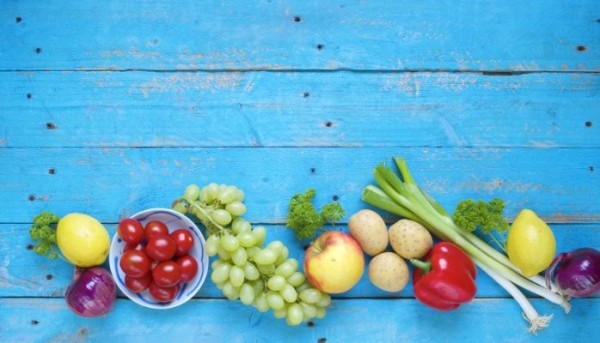"May your food be your first medicine" Hippocrates
 Alzheimer's disease, cancer, diabetes, cardiovascular problems, all these diseases of civilisation can be largely avoided by changing our eating habits, explains Dr Béliveau, Doctor of Biochemistry, Scientific Director of the Laboratory of Molecular Medicine and Chair of Cancer Treatment at the University of Quebec in Montreal, referring to the famous quote by Hippocrates, nearly 2,500 years ago "May your food be your first medicine". At the heart of the Laboratory of Molecular Medicine that he directs, the Canadian professor has been researching food molecules and their virtues with his team for more than 30 years.
Alzheimer's disease, cancer, diabetes, cardiovascular problems, all these diseases of civilisation can be largely avoided by changing our eating habits, explains Dr Béliveau, Doctor of Biochemistry, Scientific Director of the Laboratory of Molecular Medicine and Chair of Cancer Treatment at the University of Quebec in Montreal, referring to the famous quote by Hippocrates, nearly 2,500 years ago "May your food be your first medicine". At the heart of the Laboratory of Molecular Medicine that he directs, the Canadian professor has been researching food molecules and their virtues with his team for more than 30 years.
We know today, thanks to numerous population studies carried out on thousands of people that certain foods reduce the risk of disease or increase survival following serious illness. In cardiology for example, a centre in Montreal treats patients who have suffered a heart attack: we make them exercise and point them towards a mediterranean diet, thus reducing their risk of mortality by 30%. Ideally after a cancer, we should be prescribing an anti-cancer diet. We know for example that 3 daily portions of cabbage and broccoli increase survival rates by 60% in people who have been diagnosed with bladder cancer.
A food which is inexorably losing its substance. More and more processing for less and less nutritional content.
Do you know how many tomatoes you had to eat in 2016 to have the same quantity of micronutrients as one tomato in 1970?
Twenty-one, you needed to eat 21 tomatoes if you wanted to have the same quantity of micronutrients as a single tomato eaten in 1970.
The Agence d'aide à la Coopération Technique et au Développement (ACTED, French NGO), Concern Worldwide (Irish NGO) Welthungerhilfe (German NGO) and the WHO published a report which warned industrialised countries about the phenomenon of "invisible hunger", which affects twice as many people globally as hunger and weakens the immune system and intellectual capacity. Sneaky, pernicious consequences which are often too late in being linked to their real causes to prevent damage.
Aside from the health consequences, the International Food Research Insitute, reported that the situation cuts the Gross Domestic Product of most developed countries by between 0.7 and 2%.
In some areas, like the state of MIssissippi, there is an obesity rate of up to 88% often due to lack of balance between macronutrients and micronutrients. In Canada, half the country's budget is now allocated to health. We are witnessing a breakdown in the transmission of culinary knowlege from mothers to daughters. This culinary void has been filled by the food industry and we are seeing a wave of health epidemics related to junk food and the accelarated pace of life in our modern societies which encourages the consumption of fast food and ready-to-eat meals. Fats, sugars, additives, dyes and pesticides are more present than ever in food and disease is on the increase.
And what if the solution already exists? If nature already provides the food of the future?
A food, already considered as a super food in Europe, packed with more than 100 nutrients, easily digestible, capable of offsetting the micronutrient deficiencies caused by poor soil, intensive farming, junk food and the ever increasing pace of life.
The only food that man can eat exclusively for a whole year with just water without showing any signs of nutritional deficiency.
And what if this food didn't rely on arable land, the only way of feeding a growing population.
And what if this food didn't need much water, 3 times less than soya, 6 times less than corn, 50 times less than beef.
An what if, in addition, this food didn't require deforestation and removed a large quantity of the carbon dioxide that human activity produces by burning fossil fuels or producing and transporting cement.
It would be a dream, a sniff of wellbeing, a real challenge, finally accepted by our industrialised countries.
This dream exists , it is within reach, contained in Spirulina, an algae which was able to survive around 3.7 billion years ago when the atmosphere of our planet was incapable of supporting any form of life. An algae which was even able to tranform a hostile environment into an oxygen rich environment.
Spirulina's journey has been long, scattered with obstacles created by the hostile environment in which it started its evolution. But today, having evolved millions of times, having adapted itself, having succeeded in surviving and prospering in new environmental conditions, spirulina offers an intrisic and unprecedented wealth. A real gift from nature to our diet.
New forms are now available, it's no longer necessary to take powders, pills or capsules, they are pre-dispersed, flavoured and ready to use. These new forms are highly digestible as a result of new technologies which facilitate absorbion by the intestinal villi for enhanced bioavailability of micronuturients.
Our bodies are thus armed to adapt to changing times.